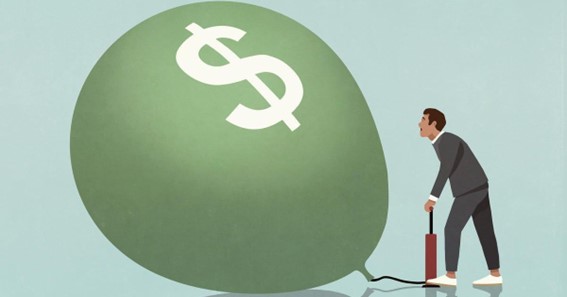The world is experiencing unprecedented inflationary pressure, triggering market volatility and clouding the economic outlook. In this article, we will examine the factors contributing to this surge in inflation, the impact on market volatility, and the uncertainty surrounding the economic outlook.
The rapid increase in prices of goods and services, reflected in the inflation rates, is due to the current inflation surge, causing a decrease in consumers’ purchasing power. This leads to market volatility and uncertainty about the economic outlook resulting in fluctuations in commodity prices and a sell-off in the stock market, causing concerns among investors about its potential consequences on businesses and consumers. The long-term impacts of this unprecedented inflation on economic growth and stability are still unclear, leading to uncertainty among economists and analysts.
Factors contributing to the current inflation surge
There are several factors contributing to the recent inflation surge.
Supply chain disruptions
One of the main factors is supply chain disruptions caused by the COVID-19 pandemic. The pandemic caused disruptions in supply chains globally, leading to shortages in goods and raw materials. This resulted in a surge in prices, making it difficult for businesses to maintain profitability and forcing them to increase prices.
Fiscal and monetary policies
Fiscal and monetary policies implemented by governments have also contributed to the inflation surge. Stimulus checks and low-interest rates have injected more money into the economy, increasing demand for goods and services. This increase in demand has caused prices to surge, contributing to inflationary pressures on the economy.
Market Volatility
Market volatility is caused by various factors, including inflationary pressures, which affect several sectors differently. The sectors most affected by inflationary pressures include consumer goods, transportation, and housing. As prices for these goods and services increase rapidly, consumers may have reduced purchasing power, decreasing demand and impacting the industries that provide them.
It is also causing the currency markets to react, leading to shifts in exchange rates. As the value of currencies fluctuates, businesses and consumers relying on international trade may need help conducting their operations.
Economic Outlook
The current inflation surge is alarming economists and analysts, as they foresee significant consequences for businesses and consumers. Reduced purchasing power is a major concern, as skyrocketing prices make it harder for people to afford goods and services, potentially slowing economic growth and increasing unemployment. Businesses may also face decreased revenue due to reduced consumer spending, leading to lower profits and potential cost-cutting measures.
The inflation surge has potential consequences for businesses and consumers. Rising prices may force businesses to raise their own prices, decreasing consumer confidence and reducing purchasing power. However, businesses adapting to the economic climate may thrive and find new opportunities. Governments are taking steps to address the issue, including central banks increasing interest rates and governments reducing spending. The effectiveness of these measures remains to be seen, but action is necessary to prevent further economic disruption.
Global Implications
Ripple Effects on international trade and Investment
The inflation surge may have ripple effects on international trade and Investment. Higher prices may cause a decrease in demand for imports, leading to a decrease in international trade. Moreover, it may cause investors to become wary of investing in countries with high inflation rates, leading to a decrease in foreign Investment.
Potential long-term impacts on the global economy
The potential long-term impacts of the inflation surge on the global economy are still uncertain. However, some economists suggest that high inflation rates may lead to decreased economic growth, decreased value of currencies, and increased social unrest.
Conclusion
The unprecedented inflation surge is causing market volatility and uncertainty, impacting various sectors, commodity prices, and currency markets. Factors such as supply chain disruptions, labor shortages, fiscal and monetary policies, and the global economic recovery from the pandemic contribute to this inflation surge. Governments are implementing policies to curb inflation, but the long-term impacts on the global economy remain uncertain. Close monitoring of inflation rates and market volatility is crucial for informed decision-making in Investment and economic policies.

